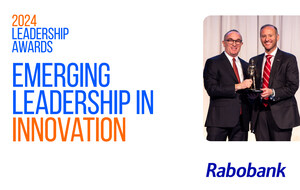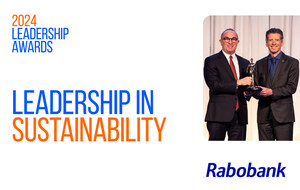Rabobank Report: Unstoppable Rise Of Quick Service Restaurants In United States
By 2018, Spending on Food Away from Home will Exceed Food at Home for First Time
NEW YORK, June 18, 2012 /PRNewswire/ -- A new report authored by Rabobank's global Food & Agribusiness Research and Advisory group looks at the growth of the Quick Service Restaurant (QSR) or fast-food sector in the United States, in particular the category's success in weathering economic downturns, managing input costs, and responding to changing consumer tastes.
In the report, Rabobank analyst Nicholas Fereday charts the remarkable resilience and robustness of the U.S. restaurant industry in recent years, noting that the industry's contribution to U.S. GDP exceeds that of food manufacturing. Rabobank predicts restaurants will continue to take an increasing slice of the U.S. consumer food dollar, with leading QSRs being the particular beneficiaries of consumers' growing preference for eating out vs. at home.
Key Points of the Report
- The U.S. restaurant industry has an excellent track record of riding out the highs and lows of the business cycle and taking a growing slice of the consumer food dollar.
- Rabobank predicts the growth of spending on food away from home will continue to outpace spending on food at home and, by 2018, will exceed spending on food at home for the first time.
- Although there was a temporary emphasis on eating more at home during the 2007-2009 recession, that proved to be a blip. Contrary to some views, Rabobank believes that the U.S. has not reached a turning point in consumer habits or a move back to thrifty habits and home cooking; it would take a cultural sea change to completely reverse consumer behavior and preference for dining out.
- Adept at maintaining brand relevance, the QSR sector will capture most of the gain in spending on food away from home.
- QSRs have adopted a number of winning strategies to either sustain their growth over the long term or to successfully navigate through the current recession and macroeconomic uncertainty.
- Within the QSR world, the "fast-casual" concept – for example, restaurants such as Chipotle Mexican Grill and Panera Bread – has become a rising star.
- By addressing the nutrition and quality issues that currently hound QSRs, coupled with a low-cost service model, fast-casual restaurants point towards a new direction for the QSR sector.
Winning Strategies of QSRs
- Giving consumers what they want: Successful QSRs are adroit in profiting from giving consumers what they want by responding to longer-term lifestyle changes and to emerging trends towards healthy eating options, premium coffee, etc.
- Early adoption and expansion of the franchise business model: Franchising spares the franchisor the heavy capital investments and management responsibility involved in building a chain of restaurants, while providing a stable stream of rent and royalty income and much faster growth.
- Driving costs out of the system through supply chain efficiencies. Over time, many leading QSRs have also proven very adept at driving costs out of their supply chain, employing risk management practices and leveraging scale. QSRs have also learned the value of close collaboration, building long-term partnerships with their decentralized supply and distribution networks.
- Adapting to uncertain times. Since the 2007-2009 recession, some chains and restaurant concepts have fared better than others. Rabobank attributes their success in part to pioneering strategies such as menu diversification, improving the look and feel of the restaurants, branching out into more eating occasions, and improving the quality of dining experience.
- Fast-casuals challenge the conventional view of QSRs. These restaurants position themselves in a sweet spot, combining the convenience and relative cheapness of fast food with a higher quality dining experience.
Rabobank is a global financial services leader providing wholesale and retail banking for the food and agriculture industry, asset management, leasing, real estate services, and renewable energy project financing. Founded over a century ago, Rabobank today is one of the largest banks in the world, with nearly $1 trillion in assets and operations in over 40 countries, and ranks among the top rated private banks by S&P and Moody's. In North America, Rabobank is a premier bank to the food, beverage, and agribusiness industry and a leading financier of renewable energy and energy infrastructure projects. www.Rabobank.com
SOURCE Rabobank
WANT YOUR COMPANY'S NEWS FEATURED ON PRNEWSWIRE.COM?
Newsrooms &
Influencers
Digital Media
Outlets
Journalists
Opted In






Share this article